Podcast: Download (Duration: 1:09:17 — 56.3MB)
Subscribe: Spotify | TuneIn | RSS | More
Today I have a solo show on what I learned at London Book Fair (LBF), including the challenges that authors are facing, and what they are doing about it. Plus, my thoughts on Blockchain for Books and monetizing mobile reading apps.
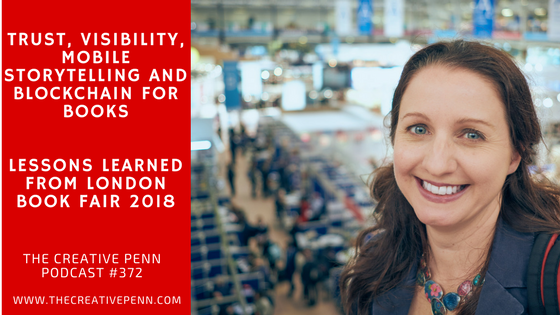
In futurist news, Google unveils Talk to Books, which uses “semantic search,” drawing on the ability of the tool’s AI to understand natural human language, as well as Semantris, a word association game. Both technologies aim to test and improve the underlying software. Plus, Knowhere introduces an AI that “aggregates news from hundreds of sources and create three versions of each story: one skewed to the left, one skewed to the right, and one that’s meant to be impartial.” The beginning of the AI author voice?

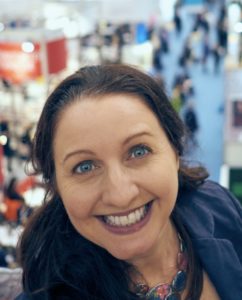
You can listen above or on iTunes or Stitcher or watch the video here, read the notes and links below. Here are the highlights and full transcript below.
Show Notes:
- Your art is everything. Your art is nothing. Why the Book Fair gives an insight into the publishing industry and our place within it.
- The continued challenge of visibility, and how some authors are facing it
- Is this the end of co-opetition?
- Developing multiple streams of income
- Who to trust? The importance of personal relationships – and checking the Alliance of Independent Authors Watchdog listing
- Mobile storytelling and how authors are getting paid for it
- Blockchain for Books, a report on the launch by The Alliance of Independent Authors
- How to make the most of London Book Fair, or any of the other Fairs, if you want to attend as an author
You can find London Book Fair here, check the hashtag #LBF18 or #LBF2018 if you want to see tweets and pics about it. Some of my pictures are included in the text below.
Lessons Learned from London Book Fair
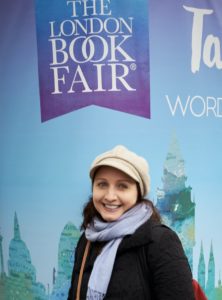
I’ve been to the London Book Fair for the last six years and even though it leaves this introvert recovering in bed with a migraine, it’s worth attending for what I learn and who I meet every year. Thanks to everyone I met from the author community!
In this article, I go through my lessons learned from #LBF2018, plus some thoughts from authors I interviewed along the way, and my own reflections on sessions I attended.
(1) Your art is everything. Your art is nothing.
This is the challenge of the Book Fair for me, and it is both humbling and exciting to realise it every year.
Walk around the massive halls and witness the extent of the publishing world.

From the dominance of the Big 5 with their multi-tiered platforms filled with busy meetings and the billboard size faces of brand-name authors … To the niche publishers of motoring atlases, museum hardbacks, comics and graphic art, poetry, spirituality, or gift stationery … To the stands of international publishers – China to Latvia, from the University of Chihuahua to Abu Dhabi, from Russia to Catalonia.
And on, down the back of the fair to the wholesalers. Witness what is a shocking sight for authors (but a normal part of the publishing business.)
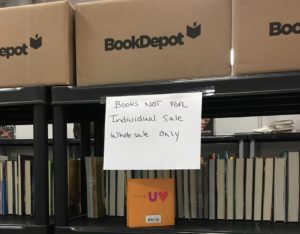
Mounds of books, reams of covers, all discounted to rock bottom prices, bought in bulk and shipped around the world to sell in secondary markets.
It makes me realise how minuscule the indie author eco-system is in comparison to the juggernaut of massive publishers and the vast number of deals that go on across the world.
The majority of book sales are not measured by Amazon bestseller charts, and much of it happens in the business to business space. We just see a slice of trade publishing, but of course, we can’t do everything. We must focus on what continues to make us happy creatively and financially, but it’s clear that the industry is a whole lot bigger than our corner of the market.
So when I walk around the Fair, I’m proud to be part of the publishing industry, but I also feel out of my depth, overwhelmed by the possibilities and yet also aware of being on the edge. I’ve had a similar feeling whilst scuba diving, watching fish dart around, entire eco-systems living their lives oblivious to me.

And therein lies the paradox. Because we have to understand that our art is everything. We have to think that it is the most important thing in the world to write, to publish, to reach readers, or we couldn’t go to the blank page every day.
But we also have to let go and understand that we are but a brief spark in the firmament of the publishing industry.
(2) The continued challenge of visibility
I met up with a lot of indies at LBF, some of them making multi-six figure incomes and others just starting out. I asked many of them about the challenges they were facing right now, and also about what they were doing to deal with it.
Unsurprisingly, most authors pointed out the continued challenge of visibility in an ever-growing sea of books.

Bestselling crime author, L.J.Ross, said that she faces the challenge by focusing on story first. “Without a product to sell, there is no business.”
She stated that it is easy to lose the yardstick of what set you apart in the beginning, and to always “remember that you are not writing to impress other writers. The reader is king.”
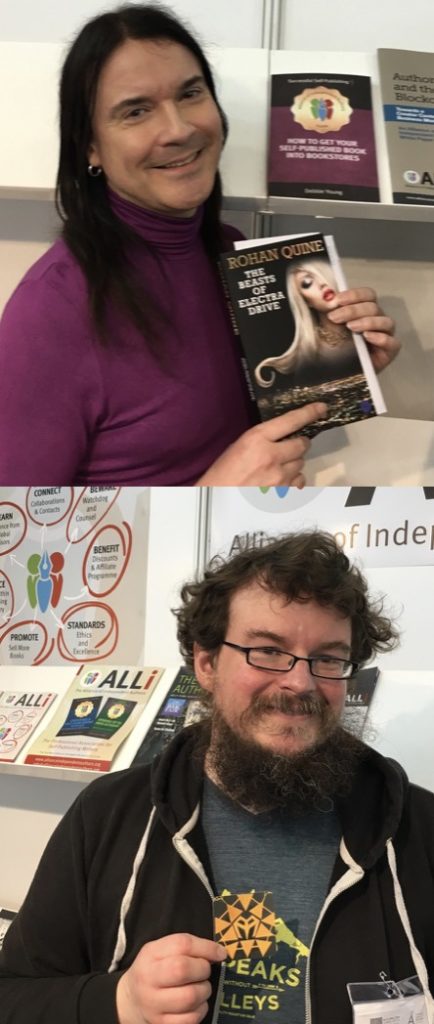
Literary magical realism author, Rohan Quine, talked of the difficulty of “locating a path through the thicket” of book marketing and the importance of continuing to learn, even if you don’t naturally have the “marketing gene.”
Rohan talked about playing the long game and developing strengths as well as expanding your comfort zone over time. He makes sure his book metadata is correct on all the vendors, and plays an active part in the Alliance of Independent Authors, networking with other indies and building relationships along the way.
Poet, crime author and diversity activist Dan Holloway talked of the difficulty of having your art taken seriously as an indie author. Dan speaks on panels at bookstores and literary festivals and finds there are more questions about how he publishes than the themes of his books, which the traditionally published authors are always asked about.
[I have personally been included on panels at Bristol Crimefest and Thrillerfest with other traditionally published authors and haven't been treated any different, so I hope this will continue to change.]
Dan’s response is to move into speaking to corporates around creativity and he has also developed a game, Mycelium, which teaches creative thinking.
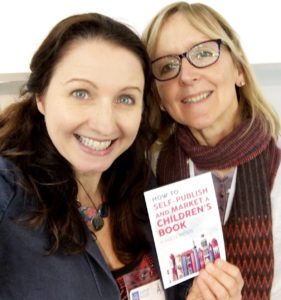
Children’s author, Karen Inglis, spoke of the continued difficulty of not being able to market direct to the reader, but noted that there is potential in using paid ads for print books aimed at marketing directly to parents.
She noted that if you want to write for children, you really do need to enjoy meeting your readers, going into schools and libraries, as well as developing relationships with teachers, librarians, and parents. Karen has a non-fiction book coming out soon, How to Self-Publish and Market a Children’s Book, and she’ll be coming on the podcast to talk about it later this year.
Helena Halme, author of Nordic contemporary women’s fiction, talked about how the continual changes in the self-publishing industry can be a real challenge for authors to keep up with and notes the importance of attending industry events, listening to podcasts, reading blogs and also being active in the author community to stay informed.
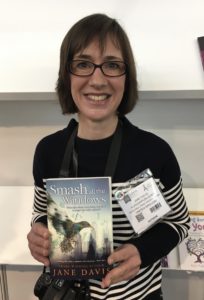
Prize-winning literary fiction author, Jane Davis, mentioned something I’ve heard all over the indie community – that ebook sales drop off once you stop paid ads, and that continued sales are dependent on continued payment for advertising. Jane is meeting this challenge by developing relationships with book bloggers, and building her email list, investing time instead of more money. She’s making a big effort with her latest launch, doing print ARCs and focusing her marketing efforts.
This issue with ever-growing ad spend was echoed by thriller author, James P. Sumner, who said that it is increasingly expensive to maintain a consistent sales level on the Amazon store without paying for more ads.
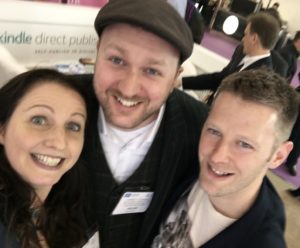
James is looking at alternative ways to expand his brand, doing some creative writing tutoring and preparing to launch an online course once he has honed his material.
He also recommends getting involved with the indie author community, building a network amongst your peers and growing together, which often provides marketing and business opportunities along the way.
Is this the end of co-opetition?
My own thoughts on increasing ad spend crystallised at the fair as I talked about this topic with thriller author, DV Berkom.
I don’t believe in a zero-sum game for books. I believe EVERYONE should write a book, because every person who writes a book will buy and read far more books than they could ever produce, and in that way, we are a self-sustaining industry.

So there should be no competition among writers. It should be co-opetition, co-operating, co-marketing with people in your genre. We are stronger together.
This is certainly the way I have always run my creative business. It’s why I interview other writers on my podcast, feature them on my blog, tweet them on social media, and promote their books to my email lists.
But paid ads have changed things because we ARE now competing with each other. Pay-per-click ads are all about competing for keywords, upping a bid until you win, and then doing it again and again. Prices go up, your return gets sliced, and in the end, the advertisers come out on top.
Yes, I continue to use paid ads for my book sales and as a core part of my business marketing. But the majority of my writing business income is based on content marketing which delivers targeted search engine traffic built from years of quality articles, podcasts and videos, plus relationship building in my niche. I cover all this in detail in How to Market a Book.

(3) Pivoting towards multiple streams of income
Developing multiple streams of income has been my soapbox for almost ten years now, and so it was interesting to hear that one of the responses to the challenge of visibility is not to keep pushing or ploughing more money into marketing, but adding other streams of income. This offsets the cost and provides a wider and more stable base for an author business.
Both James P. Sumner and Karen Inglis are moving into writing non-fiction books to go alongside their fiction portfolio. Dan Holloway talked about speaking and licensing his game.
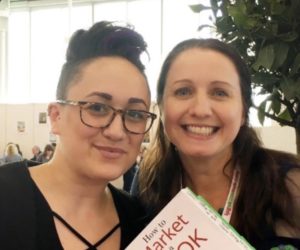
YA fantasy author, Sacha Black, talked about the difficulty in selling fiction. “My non-fiction sells itself, I don’t have to do a lot for it to bring in a fair chunk of change each month, but selling fiction is a LOT harder.” Although Sacha is continuing to use paid ads, she also mentioned “diversifying income streams so as not to be so reliant on having to find her audience and sell books constantly.”
Alison Jones, author of This Book Means Business, and publisher of non-fiction and business books said, “Finding your readers is easier than ever because of the many tools we have, but those readers have limited amounts of attention.”
Alison talked about focusing on the book as part of a bigger platform, giving your readers a reason to care by drawing them in with podcasts, videos, speaking and training, which can also provide other streams of income.
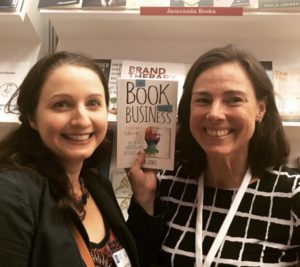
Speaking enables you to incorporate bulk sales into your business model, including the book as part of your speaker’s fee.
The purpose of the book is not to become a bestseller, but to build a business, and create a funnel into higher revenue products. I’ll be expanding on this in How to Write Non-Fiction, available end May 2018.
I am more and more aware of this dichotomy in the indie community. There is a pervasive focus on vanity metrics like sales ranking or number of books sold over profit and money in the bank.
Many consider it ‘better’ to reach number one on Amazon in a category where they have paid for a ton of advertising than bulk sell thousands of books that no one will ever know about but have thousands of dollars extra in the bank.
As Orna Ross noted in the Blockchain for Books white paper,
“Many authors crave attention more than money and overvalue their work emotionally while undervaluing it commercially.”
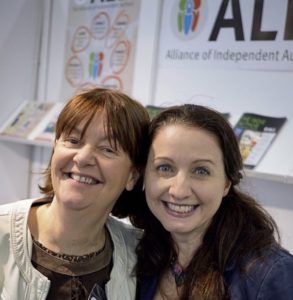
Orna is a literary fiction and creative non-fiction author, poet and founder of the Alliance of Independent Authors, and told me that the biggest challenge for authors is “to understand that you are in business and what that means, as well as knowing the value of what you create.”
Orna has challenged herself to understand her ‘comps,’ or comparison titles, and to dig deep into the micro-genres around her books. She also stressed the importance of looking outside the publishing world for ideas – definitely something I felt coming out of the fair. I think we have more in common with the tech community than the publishing world most of the time.
Joseph Alexander, author and publisher of books on playing the guitar, mentioned how music shops in the UK are sewn up with exclusive deals that mean he can’t work directly with them AND keep his sales on Amazon.
But instead of raging against the machine, he has started to do deals with music shops in other territories, expanding his streams of income, whilst keeping his core sales on Amazon in print. He said that “staying nimble” gives the indie author with their own rights an incredible advantage as you can do deals quickly.
[ Watch/ listen/read an interview with Joseph on his business model here.]
Taking control is certainly a wider trend, as Sam Missingham from Lounge Books noted that fewer authors “are letting publishing happen to them” these days, and that “more authors are empowering themselves” around book marketing and their creative business.
(4) Who to trust? The importance of personal relationships
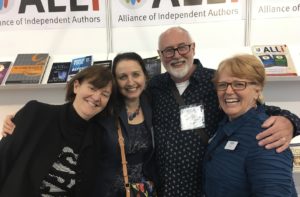
As the London Book Fair bustled with deals, Facebook’s Mark Zuckerberg faced the US Senate over the leak of millions of user records to Cambridge Analytica, so it was pertinent that so many people I talked to brought up trust – or the lack of it.
A number of people pointed out that there are increasing numbers of scams targeted at authors right now, and a lot of voices in the self-publishing space that perhaps don’t have the experience they are touting.
YA fantasy author, Sacha Black, spent a lot of time on the Alliance of Independent Author’s stand at LBF, talking to new writers about their publishing options. She was surprised at the number of people who had been given, (or read) really bad advice. “I think that for newer indie authors there’s a seriously saturated internet full of crappy advice and noise. If you don’t have a network/community of writer friends then its hard to distinguish between the fluff and the quality advice.”
Sacha recommends triple checking the credentials of anyone you’re considering working with, seek out advice from authors rather than just industry people, read reviews of books before buying them, and recognise that even good advice might not work for you. As Sacha says, “There is no ‘right' way to build your business. I’ve met a LOT of authors, and none of them have built their businesses in the same way.”
Ricardo Fayet from the freelance marketplace, Reedsy, talked about the importance of developing relationships with authors over time and checking how long a company has been in business before working with them. I first met Ricardo at London Book Fair years ago, and he’s a regular attendee at author events and conferences around the world, building Reedsy’s own credentials with his helpful advice. Listen/watch/read an interview with Ricardo about the top author mistakes here.
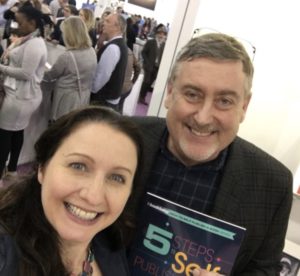
Steven Spatz from BookBaby said that his team talks on the phone to lots of customers every week, and that the personal touch is what he focuses on to set BookBaby apart from more hands-off author services companies. He calls this “people-powered-publishing,” citing personal relationships as the key to trust in an increasingly digital world.
You can listen/watch/read my interview with Steven here, and I’ll be speaking at BookBaby’s Independent Author conference in Philadelphia in November 2018. A perfect example of an online relationship developing into trust based on a conversation, and then a real-life business opportunity!
Thriller author and SPF podcaster, Mark Dawson, mentioned how many unsolicited emails he gets through his author website every day, and how persistent some of the pitches are. While those of us who are established in the author space just delete these emails, new writers may well respond and be drawn in.

Mark said, “If you are asked to pay anything to publish, then think twice. Do your research. Of course, you should consider paying for professional editors and cover design, but be wary of author services companies that don’t have your best interests at heart.”
My specific suggestion for dealing with unsolicited mail is to install a plugin like Gravity Forms so that people can’t email you directly. That step cut my unsolicited mail down considerably, and my advice for authors who have a Virtual Assistant is to direct the form results to your VA and ask them to handle those emails. These steps alone gave me back a couple more hours every week.
The answer to the trust issue is becoming part of the interwoven author community, and building relationships that develop over years.
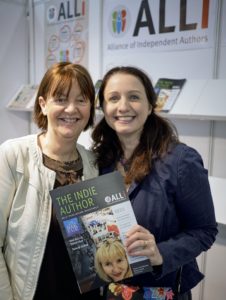
I spent time manning the help desk at the Alliance of Independent Authors (ALLi) stand near the Author HQ, along with lots of other indies taking their turn at helping others. It was great to meet authors of all levels, from those just starting out with one book to those making a very good living as an author. I’ve become friends with many of these authors over the six years that the Alliance has been at the Fair, and I learn something from them every year.
Many new authors asked about the benefit of joining ALLi, and of course, there are tangible benefits like the publications, training, advocacy, contractual advice, and the private Facebook group where you can get personalized help.
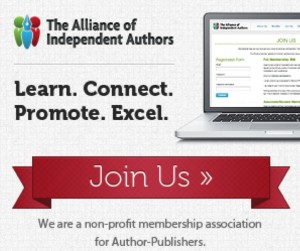
[Click here to learn more about joining the Alliance of Independent Authors.]
Interestingly, I was interviewed for a podcast at the Fair and the very first question was, “How can you keep giving away all your information for free? Why are you so generous with what you know?”
I was reminded that not everyone lives in the open and giving indie author world that I know and love. But if you want to be part of it too, come and join the Alliance of Independent Authors!
(5) Mobile storytelling
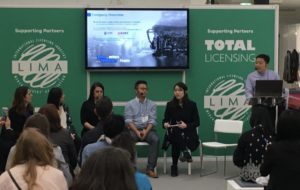
OK, moving into the futurist stuff! I attended a fascinating session with China Literature and Wattpad on the continued rise of mobile storytelling and the business model for authors who are part of it.
Wattpad has been around for years now and I have a couple of books up there, but I have always thought of it as more of a marketing platform. These days it has over 65 million monthly visitors, and Wattpad Studios has taken stories into film, TV, book deals and other intellectual property rights deals.
China Literature is an online reading (and writing) platform with 191 million monthly active users – mostly on mobile devices. They have over 6 million writers and nearly 10 million books on the platform.
China Literature just announced their expansion into the west, looking at translation rights for their massive catalogue. They noted that serialised story-telling is not new, and has more in common with how Dickens shared his stories in magazines. Some of the most popular stories are re-tellings of martial epics, with hundreds of chapters. Readers might consume 3000 words per day in a single chapter and come back tomorrow for the next instalment, with some stories stretching out for months.

The Financial Times recently reported that “cashless is king.” The article goes into Ant Financial, Alibaba’s financial arm driven by AliPay, the other mobile payment system in China. “These companies are like Facebook if it had a bank on top of it and everyone had a bank account. There is nothing like this in the West.” [McKinsey] Ant Financial and TenCent make up more than 90% of China’s $16 trillion mobile payments market.
Ways that authors are now making money through mobile storytelling:
Micro-payments per page read. China Literature has developed a culture of paying for content, as mobile payments make it much easier to incorporate this. Wattpad’s Ashleigh Gardner pointed out that this model only works in a country with billions of readers. The Amazon equivalent of pages read (KDP Select) is a share in a monthly pool of subscribers, which is different to readers paying authors for what they read, rather than being paid from a central pot.
Tips from readers, which can range into the equivalent of thousands of pounds for the most popular readers according to China Literature.
Advertising revenue from ads shown alongside stories on Wattpad. Some writers have turned down publishing contracts as the advances wouldn’t be enough to replace this revenue.
Rights deals from Wattpad Studios, as the top stories and authors are licensed into film, TV and book deals.
You might be thinking that this is all too far removed from most authors in the west, but I’m fast-forwarding to when translation is no longer an issue because of AI, when there are millions more writers out there, AND millions more readers with mobile phones wanting to read and who are used to paying for content.
The next billion users of the internet are mobile-first. If you want to reach them, you need to understand global, digital, mobile, and micro-payments.
[ Watch/listen/read an interview with Ashleigh Gardner from Wattpad here. ]
(6) Blockchain for Books
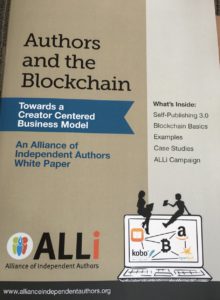
What is the blockchain?
It’s “a digital ledger that records transactions as a chain (string) of data and stores them on a decentralised network. Parties to the transaction can see and validate the same version of the truth.” It enables the “settlement of transactions in a network without reference to a central authority like a bank” – or, for example, an agent/publisher/distributor in between the author and reader.
“Blockchain allows instant value exchange directly with the content creators without the need for being routed through an intermediary.”
The white paper states, “The way that blockchain reconfigures digital text, books and media, legal agreements, monetisation of content, and payment pathways makes it a technological breakthrough for publishing. It can be used to maximise the value of the authors’ intellectual property and moral and monetary rights. It could also deliver an author-centered financial model for the first time in publishing history.”
What are the potential opportunities of the blockchain for books?
- Truly global potential for direct sales with immediate payment to the creator without the dominant distributors/middlemen currently in play .
- Smart contracts could transform intellectual property rights with transparency and security. “If you can say it, you can program it,” as Josef from Publica said. You can encode what happens to your book and payments on the blockchain, for example, money goes direct to the author on purchase, money is split between these co-writers and/or editor or anyone else who you’d like to get a cut, payment on re-sale of the ebook, truly trackable assets, and so on.
What are the things to be careful of?
- I love the possibilities of Blockchain, but it’s early days, so at this point, I’ll be keeping an eye on what’s happening, but I won’t be jumping into action just yet.
- The various ‘coins’ used for blockchain transactions are not necessarily easy to transfer into money in the real world. So you might end up getting 98% of something worthless. There’s a lot of hype and disinformation about it right now, so you need to do your research.
- You still have to find readers and market your books, and if there are no readers buying on the blockchain, you will find it even harder to sell, so until there are more mature eco-systems, it will be hard to get traction.
It's clear that authors need to be involved in the design of potential new eco-systems in order to make them author-centric, so keep an eye on this topic in the months to come!
Learn more about Blockchain for Books
- Read more the Alliance of Independent Authors Blockchain for Books whitepaper here
- Check out the recording of the launch at London Book Fair, which was fascinating, inspiring and also contains a warning for those who might jump in too fast
- Here’s the Publisher’s Weekly article on the launch, featuring Sukhi Jutla as the first Blockchain #1 bestseller
(7) Tips for attending Book Fairs as an author

Perhaps I have inspired you to attend a Book Fair?!
The Book Fairs – whether London, Frankfurt, New York, Sharjah, or any of the others – are publishing industry trade shows where agents and publishers primarily go to do rights deals.
Authors can attend, and there’s usually some sessions for authors, but the Fairs are not aimed at you. LBF has an Author HQ, where you can attend education sessions, but the event is a business and so the sessions are often run by people paying for the privilege, so author beware!
The Alliance of Independent Authors has had an active part in LBF since it launched there in 2012, and hopefully, we will now have an annual stand as well as sessions in the Author HQ and networking events.
If you want to attend:
- Get the schedule and plan the sessions you want to attend
- Organize meetings well in advance with anyone you want to meet
- Leave enough time to wander around and check out interesting things in between
- Manage your energy, especially if you are an introvert. Two days back to back with many meetings was too much for
#iamlatvia #iamintrovert Introvert beer and ads in the toilets for the introverted Latvian team. GREAT! me this year. Someone please remind me to schedule more breaks!!! See the brilliant advert in the toilets from #iamlatvia #iamintrovert.
- Join the Alliance of Independent Authors and come hang out with the indies! We are a friendly bunch and the benefits to being a member are listed here. I am a founding member and Advisor to the Alliance and it is number one recommended resource for advice by authors for authors.
R J Fawaz, Adventure/thriller author, and first-time visitor to LBF also recommended downloading the LBF App, because it helps you to plan your day efficiently and get maximum out of the fair.
It gives you a list of all the seminars and talks happening and you have the option to book it into your calendar on your phone. Also, take your time to walk around to have a look at what’s going on, take pictures and don’t be afraid to go up to stands to ask questions that may relate to your work/business. All the professionals

are helpful and will advise you and give you leaflets to read about their business. While walking around, take note of where all the restaurants and cafés are so that you can have a rest, unwind, and gear up for the next seminar.
Conclusion
As ever, I leave the London Book Fair exhausted, but excited about the possibilities ahead for writers.
Whatever changes will come, authors and creators remain at the heart of publishing. Without our writing, they have nothing to sell.
So, whether you choose to work with a publishing house, or go indie, I hope that you will value your creation and yourself in the years to come. Exciting times!
OK, that’s it for my round-up for this year. Maybe see you at #LBF2019!


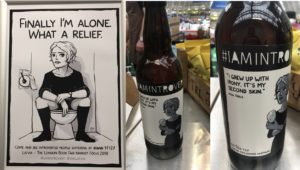


Thanks for the detailed blog post, Joanna. It’s always a pleasure for me to read your content.
I love the idea Blockchain for Books. What would be awesome is a platform on Blockchain for authors to publish and sell books. kb
I’ve just realised that in Cold Fury I’ve name a fictional Canadian prime minister Lefvebre… in my tired writers brain I just wanted a Canadian name which was french and hard to pronounce… I didn’t make the connection to Mark until just now.
I’ve also named the Colonel in charge of the deniable operators James Penn, but that was deliberate 😉
In Darkest Storm, Dusty travels under the alias Mark Dawson, but that was a weird coincidence as I wrote the first ten chapters of DS before I came across Mark as a writer.
Great clarity of analysis and temperature-taking, as ever, Joanna. Thanks for the mention and photo. And I love the paradox you identify at the end of item (1) in this post: as writers “we have to understand that our art is everything. We have to think that it is the most important thing in the world to write, to publish, to reach readers… But we also have to let go and understand that we are but a brief spark in the firmament of the publishing industry.” It’s a pleasurable challenge to create the richest expression of our whole selves and the richest reflection of the world we can possibly create , and then to infuse that best creation outward into a grander context altogether.
As always a great listen and so much to digest in the car on the long drive home from work. Thanks again for so freely sharing your insights with us plebs. 😀
For a just-starting-out-er like me, when you talk about all these things to consider and think about it’s pretty daunting and I almost think: “What am I thinking? I’ve never been part of an alliance of anything.”
But then you talk about so many people being active and helping each other out and all the cool new things coming to the author space and the IT-geek in me gets super excited and I’m again inspired to share my stories.
I was especially interested in the Blockchain for books, having people constantly bringing it up int he IT-world lately. I haven’t quite read the white paper yet (skimmed it briefly and listened to your notes), but I’m very interested to see where that goes. Here’s a very interesting read on Blockchain and all the pitfalls we have to be careful of when jumping on the bandwagon, as you say (I hope it’s okay to link this, not plugging myself or anyone I know, I promise):
https://medium.com/@kaistinchcombe/decentralized-and-trustless-crypto-paradise-is-actually-a-medieval-hellhole-c1ca122efdec
The article gets a bit technical in places, but tries to keep it layperson accessible and it somewhat focuses only on the negative, but makes a lot of excellent points. Now I’m not saying myself that it’s a craze that’s doomed before it gets started, but you see these kinds of things all the time in the IT-world. Someone touts something as the newest, greatest technology since sliced bread and you have the evangelists who say it’s the answer to the world’s problems. Some of them stick around and do become pillars of the tech world, but those are in the minority.
All I’m saying is there is A LOT of disinformation about Blockchain, especially with all the “coins” lately. Also, it’s not really a new idea or new way of doing things. The basic cryptography concepts behind Blockchain have been around for a while. Lastly, my two cents on it at this point is that, as with all these tech-fads (think “the cloud”), very much of how successful it is or isn’t, will be based on how it’s implemented. Any system or set of protocols or ideas is only as strong as the people implementing it. There’s no such thing in real life as a panacea. Especially not with technology.
Anyhow, that’s my two cents, as I said. Thanks again for a great show, blog, YouTube channel and just everything you put into the community. Always looking forward to the next one.
I totally agree on being cautious around cryptocurrency – but blockchain technology is not just cryptocurrency 🙂 I’m certainly not jumping into anything yet – but it’s good to be aware of if we want to shape how things turn out. I see it as being similar to the early days of the internet – it might take 20 years before it is mainstream.
You’re perfectly right. It’s definitely not just cryptocurrency. But my opinion and the article I shared are all aimed at the Blockchain concept itself. I was just pointing out that the cryptocurrencies have made things well and truly muddled. 😆
I agree with always being aware of these things. I think we’ll definitely move towards a cutting out the middleman kind of model, but I think it’s going to look like nothing we can envision now. And as you rightly say, Rome wasn’t built in a day. 😊
I’ve followed the podcast for years but never once thought to read the transcripts. Thanks for the in-depth look at blockchain for authors. I went ahead and got the whitepaper and I’ll be checking out Alli’s podcast on the subject after work today. 🙂
Dear Joanna,
As always, you’re such a delight to listen to and to read. I am completely new and so far, have learned so much from you and how to publish my first children’s book.
Thank you for sharing your radiance and knowledge.
A great post, Joanna! So much to ponder and comment on here — all excellent. In particular, it’s really useful to see you articulate the zero-sum advertising game that seems to have crept up on us: the double-edged sword of discoverability…. And you’re right that we therefore need to diversify and make advertising just one element of our marketing (and business) model. Of course, that goes without saying for children’s authors… My own path to non-fiction has been a long time coming — it started when I started my blog where I have shared what I’ve learned from month one. That’s the trainer in me 🙂 I’m looking at late June for publication btw if anyone asks and will start promoting actively once it’s with my editor.
I’m looking forward to your book, Karen 🙂
Hi Joanna:
Thanks for the informative precis of your take-aways from the LBF.
Re: Blockchain and Cryptocurrencies, I’ve been following these with interest, but not much real understanding. However, one You Tube entrepreneur, an astrologist, has split some of her scaled-out content to Steemit and Dtube, which pay in cryptocurrency, while still maintaining her You Tube podcast. She is paid when viewers to the other platforms give a ‘thumbs-up’ for the content. This looks like an interesting approach for authors who podcast and have other scaleable content to distribute to these new platforms, as a way to get into that market, without ‘giving away the shop’.
Thanks again for all you do to advance creative entrepreneurship!
Loretta Gatto-White
Thanks Loretta and SteemIt was included in the Blockchain for Books whitepaper and does indeed look interesting re micropayments. On my list of considerations 🙂
That was a great run-down. Thanks a million.